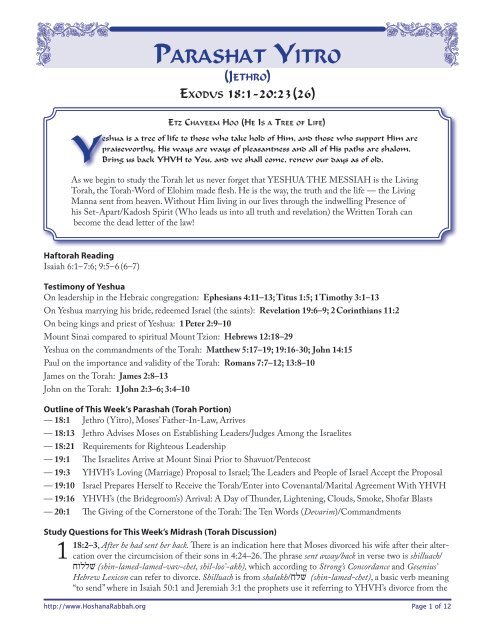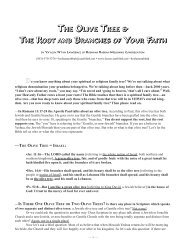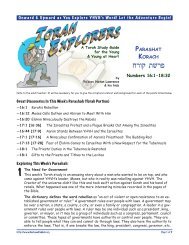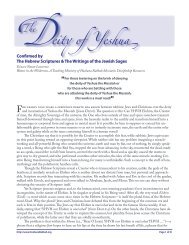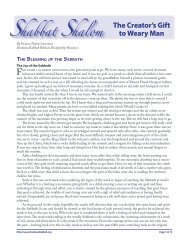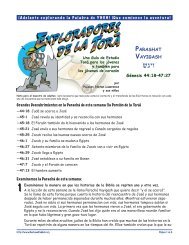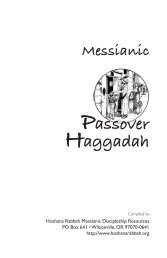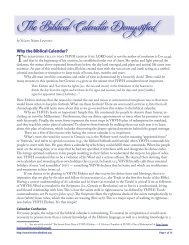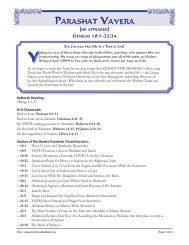Create successful ePaper yourself
Turn your PDF publications into a flip-book with our unique Google optimized e-Paper software.
Parashah <strong>Yitro</strong> (Jethro)619:6,719:8,Peter in his first epistle (1 Pet 2:9) when he refers to the saints as “a chosen generation, a royal priesthood,a set-apart nation, a peculiar people.”Am segulah/hllgso means “possession, treasure, valued property, peculiar treasure.” The basic meaning of theword is personal property. Well attested in Hebrew, Ugaritic, and Aramaic, the Akkadian sakalu, ‘to acquireproperty’ and sikiltum ‘personal property’ are also doubtless related. While the word occurs only eighttimes, it is filled with theological and spiritual treasures. The preacher in Ecclesiastes reports that the accumulationof the finest of personal possessions is sheer vanity. Those who fear the Lord become his peculiarpossessions whom he will never forget, even in that time of great judgment (Mal 3:16–18, see TWOT).“Israel was God’s personal possession (Ps 135:4). Moses reminded Israel that God chose her and redeemedher from bondage not because of her goodness, but solely because he loved her and was faithful tothe promises given to the patriarchs. Israel should reflect God’s holiness and live out his commandments(Deut 12:2ff ), reflecting his standards in a life of wholehearted compliance with the terms of the covenantmade at Sinai (Exod 19:5-6) and renewed at their entrance into Canaan. Then would they have good success(Deut 26:16–19). So it should be with all believers. These verses are doubtless alluded to in Titus 2:14and 1 Peter 2:9” (Ibid.).The word segulah occurs elsewhere in the Tanakh as well (1 Chron 29:3; Ps 135:4; Eccl 2:8; Mal 3:17).How do you view yourself spiritually? How does Elohim view you? How are these two views differentfrom each other? How you view yourself should be determined by what the Scriptures say about you.What does Elohim’s Word say, and do you believe it?• I am complete in Yeshua who is the head of all principality and power. (Col 2:10)• I am free from the law of sin and death. (Rom 8:2)• I am alive with Yeshua. (Eph 2:5)• I am far from oppression, and fear does not come near me. (Isa 54:14 )• I am born of Elohim, and the evil one does not touch me. (1 John 5:18)• I am holy and without blame before him in love. (1 Peter 1:16; Eph 1:4; Col 2:10)• I have the mind of Yeshua the Messiah/the Anointed One. (Phil 2:5; 1 Cor 2:16)• I have the peace of Elohim that passes understanding. (Phil 4:7)• I have the Greater One living in me, greater is he who is in me than he who is in the world.(1 John 4:4)• I have received the gift of righteousness and reign as a king in life by Yeshua HaMashiach.(1 John 4:4 Rom 5:17)• I have received the Spirit of wisdom and revelation in the knowledge of Yeshua, the eyes of my understandingbeing enlightened. (Eph 1:17–18)(For a complete list of what the Scriptures say about you, please see http://www.hoshanarabbah.org/pdfs/who_i_am.pdf.)Kingdom of priests. From the beginning it has been the heart of the Father to form a nation of priestswho would teach the world his ways of life and truth (Deut 4:6). (Compare Exod 19:6 with 1 Peter 2:9and Rev 1:6; 5:10; 20:6.) Discuss the spiritual implications. Could a priest fulfill his duties if he did notknow and practice the Torah? How could the Levites, who would later be scattered throughout the landof Israel, be able to teach the ways of YHVH to the nation of Israel and fulfill their duties if they did nothave an intimate working understanding of YHVH’s instructions in righteousness (i.e., the Torah)? Areyou now preparing for fulfilling your commission as a member of YHVH’s royal priesthood (1 Pet 2:9)during Yeshua’s Millennial reign by learning about and living out YHVH’s Torah (Rev 1:6; 5:10; 20:6)?(see also Exod 24:3 and 7) We will do. As noted just above, YHVH was entering into a spiritualmarital relationship with his people at Mount Sinai. (For a brief overview of YHVH’s courtship and marriageto Israel, read Ezek 16:1–16.) The phrase, “we will do” is reminiscent of what well-known phrasein the modern marriage ceremony? What did Israel promise to do? Did Israel make the promise onlyhttp://www.<strong>Hoshana</strong><strong>Rabbah</strong>.org Page 3 of 12
Parashah <strong>Yitro</strong> (Jethro)819:10,919:11,101112for themselves or also for their descendants? (See Deut 29:14–15.) Who are the modern descendants ofIsrael? (Note Gal 3:29; Rom 4:16; 9:8–11; Eph 2:11–19.)Consecrate. How did Israel, as a bride-to-be, prepare herself to meet with YHVH? How are YHVH’speople now to be preparing themselves for their spiritual marriage with Yeshua? (Compare Exodus 19:10with Revelation 19:7–9.) What is the righteousness of the saints (mentioned in Rev 19:8)? Righteousness isdefined in Psalms 119:172 as, “… all thy [Torah] commandments are righteousness.” If what the Scripturesdefine as righteousness (i.e., the Torah) was “nailed to the cross,” as is popularly taught, then who is inerror? Scripture or those who teach against YHVH’s Torah laws?The term the third day is mentioned twice here. What is the prophetic significance of this scripturalphrase as it relates to the work of Messiah among his people? For two days (verse 10) the people were towash and prepare themselves for the third day when YHVH would appear and marry them in covenantalrelationship. If a day is as a thousand years (Ps 90:4; 2 Pet 3:8) then what is this a prophetic picture of?(Read Hos 6:1–3 and Luke 13:32; compare also with Gen 22:4 and John 2:1.)19:16–19, Compare YHVH’s visitation with his people at Mount Sinai and Yeshua’s second coming or“the day of the lord/YHVH” (see Matt 24:29–30; Acts 2:19–20; 2 Pet 3:10; Joel 2:30–31). Marriages occurat both events.Exodus 19:16, 19 Voice of the trumpet [shofar]. In Jewish thought, the Scriptures speak of three great shofarblasts that have historical and prophetic significance: the first, last and great or final shofar blasts. These are:UUUUUUThe First Trump (or shofar blast) occurred on Shavuot at the giving of the Torah (Matan Torah) atMount Sinai (Exod 19:16, 19). This shofar blast was of heavenly origin and is the first time the Biblerecords the sound of the shofar being heard.The Last Trump (or shofar blast) occurs on Yom Teruah (the Day of Trumpets/Shofar Blasts, commonlycalled Rosh <strong>Hoshana</strong>) is the day of the awakening blast calling the saints to prepare their spiritualgarments in preparation for the coming Messiah or Bridegroom. This shofar blast correspondsto the last trumpet blast of Revelation 11:15 after which the resurrection of the righteous occurs(1 Cor 15:51–53).The Great Trumpet or Final Trumpet (or shofar blast called the Shofar HaGadol) is sounded onYom Kippur (Day of Atonement) signifying Elohim’s day of judgment and the return of MessiahYeshua as the King and Judge of the earth. At this time, it seems likely that he will destroy Babylonthe Great with its new world order religious, political and economic system (Rev 19:1–21 cp.Rev 18) just before the establishment of his millennial kingdom (Rev 20:1–10). Historically onthe Day of Atonement, the jubilee trumpet sounded in Israel on the fiftieth year. At this time, thecaptives were set free, debts were forgiven and all land was returned to its original owners. Matthewsays that Yeshua the Messiah will return with a great sound of a shofar (trumpet, Matt 24:30–31;1 Thess 4:16). Perhaps this is a reference to the shofar ha-gadol when Yeshua returns to earth and setsthe spiritual captives free from enslavement to the enslaving economic, religious and political tentaclesof end-time Babylon the Great.When did you first hear a shofar blast? How did it impact and change your life spiritually? As notedabove, Yeshua’s second coming will be announced with the sound of a shofar blast. Under the right circumstances,a shofar blast can be heard over a long distance. Is it possible that currently the sound of theshofar is going out over a sleeping church, which is slowly awakening from its spiritual sleep? Many areawaking to the Jewishness of Yeshua our Bridegroom, and to the Hebraic and Torah roots of the Christianfaith. The sound of the shofar, which the Scriptures liken to the voice of Elohim, can pierce the heart ofmen and help bring them back to Elohim. Embrace the truth about the shofar, and learn how and whento use it for the glorious advancement of YHVH’s spiritual kingdom!19:16–19, Compare the supernatural manifestations that occurred on Shavuot (Pentecost) at Mount Sinaiwith what occurred in the upper room in Acts 2. What are the similarities? Here is some food for thoughtin this regard:http://www.<strong>Hoshana</strong><strong>Rabbah</strong>.org Page 4 of 12
Parashah <strong>Yitro</strong> (Jethro)131415161720:2, I am YHVH your Elohim. In Jewish reckoning, the first “commandment” (better translated: “word”) isfound in 20:2 with verses 3 through 6 forming the second word and verse 7 the third and so on. YHVHwrote the first five words on the right side of the two tablets of stone and the last five words on the leftside. The Jewish sages teach that the first word (commandment) corresponds with the fifth, the secondwith the sixth and so on—the first set of words governing our relationship with YHVH and the secondparallel set of words governing our civil relationships. The two are related and linked. One can’t be fulfilledwithout the other. (Discuss this.) Relate this to what John the apostle wrote in 1 John 2:3–7, 9–11; 4:7–11,19–21; 5:1–3. Also look at Mark 12:30 and John 14:15 in this regard. Love for Elohim must always be ourprimary motivation for keeping his commandments!20:3, Before me. Lit. “before my presence” or “in my face.” When anything in our lives (a belief, a person,something we do, something we own) becomes more important to us than Elohim and his word, we arecreating a false god, and are literally throwing that false god into the face of the Living Creator of theuniverse. Is YHVH Elohim a part of everything we do, say and think? Is the love of Elohim the chiefaim of every aspect of our life? Or do we have some dark closet in our heart or mind from which we haveexcluded him? It is there that we need to begin our search for idols!20:6, Those who love me. Read the last part of this verse, then compare it with what Yeshua said in John14:15. In Yeshua’s statement, with whom is he comparing himself? Is he claiming to be the deity whogave the Torah to the Israelites at Mount Sinai?Exodus 20: 7, In vain. The third commandment shows man what his demeanor should be toward the useof the Hebrew names of the biblical deity. We read,Thou shalt not take the name of the LORD [YHVH] thy God [Elohim] in vain [desolation, devastation,ruin, destruction, emptiness of speech, worthlessness, vanity, or falsehood]; for the LORD[YHVH] will not hold him guiltless that taketh his name in vain. (Exod 20:7; see also Deut 5:11)What is it to take YHVH’s name in vain? In vain is the Hebrew word shav (tuA=/UA) meaning “emptiness,vanity, falsehood, nothingness, emptiness of speech, lying.” The root of this word means “ravage, devastate,ruin, waste, desolate, destroy.”Not only do we learn here that man should not profane YHVH’s name through improper use such asempty, lying and vain speech, but it should not be profaned by falsifying, devastating or ruining it throughsubstituting it with false names or euphemisms.Additionally, the name of YHVH should not be forgotten. If it had been YHVH’s intention to have hisname not used or forgotten, as Jewish tradition teaches, then why is the tetragrammaton (the four lettername of Elohim, which is YHVH, and is pronounced as Yehovah or Yehowah) found some 6800 times inthe Tanakh? That the non-use of his name among his people was not his intention is clear in the Scriptures,which records that the name of YHVH was so prolific that it was even used as a common greetingby the ancient Israelites (Ruth 2:4; Ps 129:8; Jer 31:23).What does Yeshua have to say about religious teachers who obviate the clear teachings of Elohim’s wordwith their man-made traditions, of which the prohibition of using the Hebrew names for Elohim is butone example? (Note Matt 15:6–9 cp. Mark 7:6–9.)20:8, Remember the Sabbath. Interestingly, this is the only commandment YHVH specifically told theIsraelites “to remember.” Why is this? What is the only one of the ten commandments that traditionalChristians fail to keep? Did YHVH prophetically envision a day when his people would fail to rememberthe seventh-day Sabbath? Why do people have such a hard time keeping the Sabbath set apart? Why willsome Christians extol unendingly the virtues of keeping the “Ten Commandments,” but when it comes tokeeping the fourth one, excuse after excuse is given to get out of it? What are the deeper spiritual implicationsof this? Why are so many redeemed Israelites, who upon having been exposed to the truth of theSabbath, still struggling with keeping the Sabbath kadosh (or set-apart) unto YHVH?In Exodus 20:8, the Hebrew word for remember is zakar, while in the parallel passage to this verse (Deut5:12) it says to observe (Heb. shamar) or literally “keep, guard, or protect” the Sabbath. In comparing thehttp://www.<strong>Hoshana</strong><strong>Rabbah</strong>.org Page 6 of 12
Parashah <strong>Yitro</strong> (Jethro)YHVH Elohim, over-arches everything and is the very character and nature of YHVH himself and is the pathwayof truth, righteousness and light which, if followed (obeyed) will lead humans to an eternal (never-ending) andspiritual relationship with YHVH Elohim (their Heavenly Father).Article continued at http://www.hoshanarabbah.org/pdfs/torah_b4_moshe.pdfHaftorah Reading—Isaiah 6:1-7:6; 9:5-6 (6-7)It Is Darkest Before Dawn—Before the Day Star Arises—Messiah, the Sun of Righteousness!Both the Parashah and Haftorah portions record humans experiencing a revelation of the glory ofYHVH. In the former instance, this event marked the beginning of Israel becoming a set-apart (kadosh) nationbefore YHVH, while in the latter case it marked the beginning of the end for the nation of Judah. Yet despite theimminent demise of the southern kingdom, Isaiah’s vision, which seems to have launched his prophetic ministry,stressed the fact that regardless of the sinfulness of Judah, YHVH sovereignly ruled from his throne in glory.Some commentators believe that Isaiah saw his vision while in the temple in Jerusalem, but such a view doesnot explain why or how he was allowed in there (Soncino Pentateuch). Others say that he was only shown a vision(similar to the vision of Ezekiel) of the Merkavah or the heavenly court where the angels pay homage to Elohim(ArtScroll Chumash).16:1, In the year that king Uzziah died. Uzziah was the king of Judah who imperiously marched intoYHVH’s temple (hekal) and profaned it when he illegally offered incense therein—something only thepriests were allowed to do. YHVH immediately struck him with leprosy. He remained a leper until theday of his death (2 Chr 26:16–23). It was after this sordid desecration of the temple that Isaiah had hisvision, which marked the beginning of his forty-odd-year-long ministry.26:4,3DespiteThe house was filled with smoke. The Hebrew word for smoke is ashan/IAG/ayin-shin-nun sofit (Strong’sH6227) and derives from a root word (Strong’s H6225, same Hebrew spelling) meaning “to fume, to beangry, furious or wroth.” The ArtScroll Chumash states that this was a sign to Isaiah from YHVH that theKingdom of Judah was going downhill toward destruction and exile (p. 1155). Although Jotham, Uzziah’sson, was a righteous king who reigned for 16 years, Ahaz, his son, was another corrupt and idolatrous kingfor which words of rebuke were not long in coming from the lips of Isaiah. From Isaiah 6:1 to 7:1,16,years pass, and no mention is made of Jotham.YHVH expresses his anger in the temple vision, then begins to speak about a spiritually hard-heartedpeople who refuse to see, listen or comprehend the error of their ways. As a result, their enemies wouldsoon afterwards ravage their land and take them into captivity (Isa 6:8–13), but there is no mention of Jothamand the short interlude of this righteous king. Why was this not worthy of mention? Despite beinga righteous king (2 Chr 27:2), did much really change spiritually in the land of Judah? Can a leader of anation, although professing to be a Bible-believing and “God-fearing” man, be in reality vapid and vacuous,lacking in real fruits of righteousness? Are America and other so-called Christian nations spirituallyin this place right now? Is YHVH fuming over the state of our “Christian” in name only nation that hasall but turned its back on YHVH from the church houses, to the state house, to the courthouse all the wayto the house of Congress and the White House? Furthermore, what foreign elements are beginning to atake over our land, culture and religion today in this nation so that Bible-believing and YHVH-fearingindividuals are becoming strangers in their own land?the wickedness of Ahaz, YHVH still gave him ample opportunity to repent and to acknowledgethe Creator’s involvements in the affairs of men. Is YHVH presently giving our “Christian” nation, andperhaps even the nation of Israel, that same opportunity before he “lowers the boom” of his judgment onus—or is this just the idle speculation a fringe element of folks who are obsessed with end-time propheticand apocalyptic scenarios and who take Bible prophecy too seriously?http://www.<strong>Hoshana</strong><strong>Rabbah</strong>.org Page 8 of 12
Parashah <strong>Yitro</strong> (Jethro)4Thoughjudgment was (is) coming upon Judah (America and Israel?), YHVH through the prophet Isaiahgives a message of hope, restoration and redemption through his Messianic prophecies that follow. Readthe rest of Isaiah chapter seven, along with portions of chapters eight and nine and identify the propheticMessianic passages found therein and relate them to Yeshua.Although the latter part of Isaiah chapter seven is not part of this week’s Haftorah portion, we will neverthelessdiscuss this section, which is one of the great Messianic prophecies in the Bible. It is referenced in Matthew’sGospel (Matt 1:23) as having been fulfilled in the Person of Yeshua the Messiah. Please note that this excerpt(below) is part of a larger work available on our web site entitled “The Incarnation and Virgin Birth of the Messiah—Prophesiedin the Hebrew Scriptures.” (http://www.hoshanarabbah.org/pdfs/vbirth.pdf )Isaiah 7:11Ask thee a sign of YHVH thy Elohim; ask it either in the depth, or in the height above.Commentary:The word sign is the Hebrew word ,UT owth/aleph-vav-tav (Strong’s H226) meaning “sign, token, signal, a beacon,a monument, evidence, prodigy or omen.” Some who are opposed to the virgin birth interpretation of Isaiah 7:14will say that owth is never used in Scripture in reference to a miraculous sign. To this contention we produce thefollowing Scriptures which show evidence to the contrary. Owth is indeed used in reference to a miraculous sign:Exodus 4:8, 9, 17, 28, 30; 7:3; 8:23; 10:1, 2; Numbers 14:22; Deuteronomy 4:34; 6:22; 7:19; 11:3; 2 Kings 20:8-11;Nehemiah 9:10; Isaiah 20:3; Jeremiah 32:20, 21. These Scriptures describe the following supernatural occurrencesusing the word owth: rods becoming serpents, the Nile turning to blood, the death of Egypt’s first born, the splittingof the Red Sea or time moving backward ten degrees on Hezekiah’s sundial. So when Isaiah 7:11 uses theowth to describe a virgin miraculously giving birth to a child such an interpretation is not a biblical hermeneuticaltwist on Scripture.The word depth is the Hebrew masculine noun ENG aymek/ayin-mem-qof (Strong’s H6009 from H6010)meaning “valley or depression.” This same Hebrew word in its adjective form (same spelling, different vowelpoints) refers to the “depths of sheol” or hell (Prov 9:18; Job 11:8). In Psalm 139:15, David in reference to his formationin his mother’s womb (verse 13) says, “I … was curiously wrought in the lowest parts of the earth (aretz/eretz). .RT Aretz/aleph-resh-tzadik sofit (Strong’s H776) is the commonly used word for earth or land in Scripture.A valley or depression is the lowest part of the earth. Here David figuratively likens his mother’s womb to a lowplace or depression in the earth. Though the Hebrew words for depth in Isaiah 7:11 and lowest parts in Psalms139:15 are different, the Hebraic concepts seem connected and analogous.The word height is the Hebrew word VVCD gabahh/gimel-bet-hey-hey (Strong’s H1361) and means “to soar, tobe lofty, to exalt.” This root word in its adjective form is also gabahh (Strong’s H1362) with the only difference betweenthe two words being a slight vowel pronunciation difference in the second syllable. This word means lofty orhigh. We see this adjective used in Job 35:5 as a poetic reference to heaven (shamayim) as well as in Isaiah 55:9, andin Psalm 103:11, which says “For as the heaven/shamayim is high above the earth …” or “according to the heightsof heaven” (alternate Hebrew rendering, kjv marginal notes).The word above, which is opposite the word height in the passage under analysis, is the word KGN ma’al/memayin-lamed(Strong’s H4605) meaning “upward, above, overhead, from the top, exceedingly.” Thus, the phrase inthis verse could be rendered as “highest heaven” (where YHVH abides). The word ma’al can be used as an adjectiveto refer to heaven above where YHVH dwells (Deut 4:39; Josh 2:11).What is the point we are trying to make here? YHVH prophesies, through Isaiah, that he will give a supernatural,miraculous sign to the house of Judah from both the depths (womb of a woman) and the highest heavens.In verse 14, Isaiah speaks of “the [the Hebrew uses the definite article the] virgin or the young maiden” (dependingon your Bible translation) giving birth to a son named Immanuel or El With Us. Now great controversy has ragedas to the meaning of the word virgin (Heb. almah). Does it refer simply to a young maiden or to an actual virgin?Much has been written by scholars on both sides of this hotly debated issue and it is not the scope of this work tohttp://www.<strong>Hoshana</strong><strong>Rabbah</strong>.org Page 9 of 12
Parashah <strong>Yitro</strong> (Jethro)deal with this particular subject. Both sides (the pro-virgin birth side versus the anti-virgin birth of Messiah side)have valid points to their credit. This author maintains that if Isaiah 7:14 were to stand alone it would be difficult,if not impossible, to prove the virgin birth either way. However, with the context of verse 11 considered (not tomention the other references in the Hebrew Scriptures referring to the virgin birth of the Messiah which we areconsidering in this work) it seems that Isaiah had one thing in mind in penning verse 14: the Messiah would beborn of a virgin. He would be formed in the womb of a woman (without the seed of a man—see Gen 3:15) and atthe same time have origination from the highest heaven. This seems to be a clear reference to the incarnation thatYHVH would miraculously fuse (by the Set-Apart Spirit [Matt 1:20]) with the physical egg of a woman to formthe Yah-Man (God-Man)—a miraculous act referred to in Christian theology as the incarnation or the hypostaticunion.In Isaiah 9:6–7 (The Closed Mem: o)6 For unto us a child is born, unto us a son is given: and the government/dominion shall be uponhis shoulder: and his name shall be called Wonderful, Counselor/Advisor, the Mighty El, TheEverlasting/Eternal Father, the Prince of Peace/Sar Shalom. 7 Of the increase of his governmentand peace there shall be no end, upon the throne of David, and upon his kingdom, to order it, andto establish it with judgment and with justice from henceforth even for ever. The zeal of YHVH ofHosts/Legions will perform this. (Emphasis added.)Commentary:In this very clear reference to the forthcoming Messiah of Israel, the prophet Isaiah utilizes a literary device foundnowhere else in the Tanakh (Hebrew Scriptures) to convey a hidden, prophetic message concerning the nature ofthe Messiah.This hidden message is found in the Hebrew word l’marbeh, (translated as “of the increase”) found in verseseven above. The word l’marbeh written in Hebrew letters would normally look like this: vcrnk. The second letterin from the right (Hebrew reads from right to left) is the Hebrew letter mem (n) corresponding to the letter m inour English alphabet. According to Hebrew grammatical rules, there are several letters in the Hebrew alphabetwhich when they occur at the beginning or inside of a word have one form, but when they appear at the end of aword they have another form, or final form (sofit). The final letter actually looks different. For example, when themem appears at the beginning of or inside of a word it looks like this: n (called an open mem); however, when itappears at the end of a word in its final form it looks like this: o (called a closed mem). According to Hebrew grammarrules (which originated in antiquity), a closed mem is to be used only at the end of a word. Yet the prophetIsaiah uses a closed mem at the beginning of the word marbeh (vcrok). (The Hebrew letter k which proceeds o issimply a word-prefix meaning “to” or “for”).The word marbeh (Strong’s H4766; TWOT 2103) simply means “abundance, increase, increasing” and originatesfrom the Hebrew root word rabbah meaning “to be or become great, many, numerous, make large, increase,multiply.” Isaiah 9:7 is one of only two places where this word occurs in the Tanakh (the other one is Isaiah 33:23).One must remember that the Hebrew language is ideographic (i.e., the use of pictures or symbols in a systemof writing to represent an idea or a thing) or pictographic (i.e., characterized by picture writing) in nature. Theletters, especially in their ancient form, called paleo-Hebrew, were even more pictographic than the more modernsquare script with which everyone is familiar. Each letter was a picture of a concept, not unlike Egyptian hieroglyphics.The Hebrew letter mem in its ancient Hebrew script (from which the modern script is derived) means“water or waves of water like an ocean.” The Hebrew word mayeem is spelled with two mems: ohn mem-yud-memsofit (Hebrew Word Pictures, by Frank T. Seekins, Living Word Pictures, Inc., Phoenix, AZ: 1994). In Hebrew mysticalthought, the letter mem is not only connected to water, in accordance with its ancient pictographic origins,but with the Hebrew word ot em/aleph-mem sofit (or mother), as well as a woman’s belly or womb from whichflows water at the time of birth. The open and closed mem both have pictographic implications as well. A closedmem represents a closed womb and therefore can connote the masculine gender, which is incapable of giving birthto a child, or to a woman who is barren and incapable of giving birth. Likewise, a virgin has a closed womb untilshe gives birth to her first child. We see some of these ideas in some ancient Jewish mystical writings below:http://www.<strong>Hoshana</strong><strong>Rabbah</strong>.org Page 10 of 12
Parashah <strong>Yitro</strong> (Jethro)This is an illustrious prophecy of the incarnation of [Messiah] … He shall appear as a child, born ofwoman, born as a Jew … but not in the way of ordinary generation. He is a Son given—the humannature, in which the fullness of the Godhead was to dwell, being produced by the creative energy ofthe [Spirit of Elohim] in the womb of the Virgin (See Matt 1:20, 21, 23, 25 and Luke 1:35; Isa 7:14)”(Clarkes Commentary, vol 4, p. 65).Rev 2/9/12http://www.<strong>Hoshana</strong><strong>Rabbah</strong>.org Page 12 of 12b


